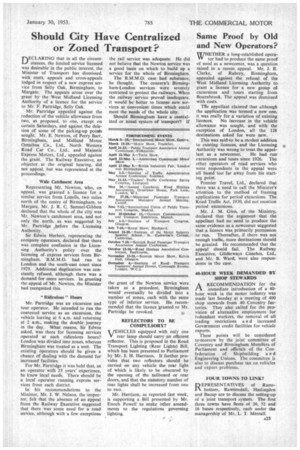Should City Have Centralized or Zoned Transport?
Page 103

If you've noticed an error in this article please click here to report it so we can fix it.
DECIARING that in all the circumstances, the limited service licensed was desirable in the public interest. the Minister of Transport has dismissed. with costs, appeals and cross-appeals lodged in respect of a new express service from Selly Oak, Birmingham, to Margate. The appeals arose over the grant by the West Midland Licensing Authority of a licence for the service to Mr. F. Partridge, Selly Oak.
Mr. Partridge appealed against the reduction of the vehicle allowance from two, as proposed, to one, except on certain Saturdays, and against the deletion of some of the picking-up points sought. Mr. E. Newton, a Perry Barr, Birmingham and Midland Motor Omnibus Co., Ltd., North Western Road Car Co., Ltd., and Majestic Express Motors, Ltd., appealed against the grant. The Railway Executive, an objector at the original hearing, did not appeal, but was represented at the proceedings.
Wide Catchment Area Representing Mr. Newton, who, on appeal, was granted a licence for a similar service from Lozells, two miles north of the centre of Birmingham, to Margate, Mr. L R. C. Samuel-Gibbon declared that the whole of the city was Mr. Newton's catchment area, and not only the north, as was suggested by Mr. Partridge .before the Licensing Authority.
Sir Edwin Herbert, representing the company operators, declared that there was complete confusion in the Licensing Authority's policy over the licensing of express services from Birmingham. B.M.M.O. had run to London and the south-east coast since 1929, Additional duplication was constantly refused, although there was a demand for more services. In granting the appeal of Mr. Newton, the Minister had recognized this.
"Ridiculous" Hours Mr. Partridge was an excursion and tour operator. He intended to run the contested service as an excursion, the vehicle leaving at 6 a.m. and returning at 2 a.m., making the double journey in the day. What reason, Sir Edwin asked, was there for licensing services operated at such ridiculous hours? London was divided into zones, whereas Birmingham was treated as a unit. The existing operators should be given a chance of dealing with the demand for increased facilities.
For Mr. Partridge it was held that, as an operator with 25 years' experience, he knew local needs. There should be a local operator running express services from each district.
In his recommendations to the Minister, Mr. J. W. Nelson. the inspector, felt that the absence of an appeal from the Railway Executive suggested that there was some need for a road service, although with a few exceptions the rail service was adequate. He did not believe that the Newton service was a good basis on which to build up a service for the whole of Birmingham.
The B.M.M.O. case had substance, he thought. The concern's Birmingham-London services were severely restricted to protect the railways. When the railway service proved inadequate, it would be better to license new services at convenient times which could meet the needs of the whole city.
Should Birmingham have a centralized or zonal system of transport? If the grant of the Newton service were taken as a precedent, Birmingham would eventually be divided into a number of zones, each with the same type of inferior service. He recommended that the licence granted to Mr. Partridge be revoked.
REFLECTORS TO RE COMPULSORY? WEHICLES equipped with only one V rear lamp should carry an efficient reflector. This is proposed in the Road Transport Lighting (Rear Lights) Bill, which has been presented to Parliament by Mr. L H. Harrison. It further provides that two reflectors should be carried on any vehicle the rear light of which is likely to be obscured by the opening of the tailboard or rear doors, and that the statutory number of rear lights shall be increased from one to two.
Mr. Harrison, as reported last week, is supporting a Bill presented by Mr. Enoch Powell to make other amendments to the regulations governing lighting.
























































































































































